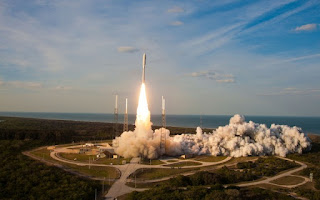How Fast Does A Rocket Have To Go To Leave Earth? - Escape Velocity
Escape Velocity

Here's a cool problem I've had a look at recently.
How fast do I have to launch a rocket off the Earth's surface for it to never come back?
This problem is not as simple as it might seem at first because the gravitational attraction the rocket is feeling is decreasing as the object moves away from the Earth. As the rocket gets further and further from the Earth, the gravitational force causing it to decelerate decreases. This means as it gets further and further from the Earth, the force causing the rocket to decelerate is decreasing. The rockets deceleration is always decreasing.This problem comes down to conservation of energy.
We know that the kinetic energy + the potential energy of the object at any moment is a constant. Kinetic energy is easy and so working out the potential energy will be the main goal in the problem.
This equation tells us how fast an object needs to go to escape the gravitational pull of the Earth. It purely depends on the mass of the planet you are on (a massive planet would have strong gravity and so you would need to throw faster) and on the height above the planets centre of mass (if you launched from a high height, gravity is weaker and so you could throw slower).
Thanks for reading. If you enjoyed this post or any of my others, follow and subscribe to my blog. Feel free to discuss anything related to this post or ask questions in the comments below.
Did you see my previous post? Click the link below to check it out

What happens if v=c?
ReplyDeleteNothing too special happens if v = c. Photons have an escape velocity and the only objects with a strong enough gravitational attraction to stop them escaping are black holes. Here the strength of gravity is too great for anything to escape.
Delete